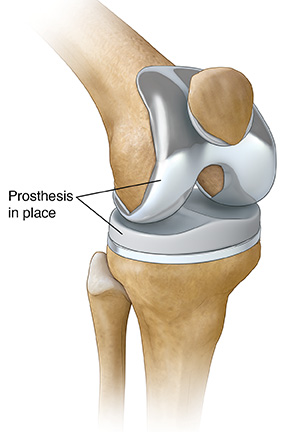Knee Replacement
During total knee replacement surgery, your damaged knee joint is replaced with an artificial joint, called a prosthesis. This surgery almost always reduces joint pain and improves your quality of life.
Total Knee Replacement
During total knee replacement surgery, your damaged knee joint is replaced with an artificial joint, called a prosthesis. This surgery almost always reduces joint pain and improves your quality of life.
Before your surgery
You will most likely arrive at the hospital on the morning of the surgery. Follow all your healthcare provider's instructions on preparing for surgery:
Follow any directions you are given for taking medicines and for not eating or drinking before surgery.
At the hospital, your temperature, pulse, breathing, and blood pressure will be checked.
An IV (intravenous) line will be started to give you fluids and medicines during surgery.
The procedure
When the surgical team is ready, you’ll be taken to the operating room. There you’ll be given anesthesia to help you sleep through surgery. One common type of anesthesia is general anesthesia (you are put to sleep). Others are spinal, epidural, or regional nerve block anesthesia. For these, you are awake, but your body is numb from the waist down. The anesthesia team will talk with you to determine which type of anesthesia will be best for you. Then a cut is made on the front or side of your knee. Any damaged bone is cleaned away. The new joint parts are put into place. The cut is closed with surgical staples or stitches.
After your surgery
After surgery, you’ll be sent to the recovery room. The nurses will give you medicines to ease your pain. You may have a small tube (catheter) in your bladder. In some cases, a continuous passive motion machine may be used on the knee to keep it from getting stiff. A sequential compression machine may be used to prevent blood clots by gently squeezing then letting go of your lower leg. You may be given medicine to prevent blood clots. Soon, healthcare providers will help you get up and moving.
When to call your healthcare provider
Once at home, call your healthcare provider if you have any of these symptoms:
Trouble breathing or chest pain (call
911 )An increase in knee pain
Pain, redness, or swelling in the calf or leg
Unusual redness, heat, or drainage at the incision site
If there is bleeding soaking your bandages
Fever of 100.4°F (38°C) or higher, or as directed by your healthcare provider
Shaking chills
Total Joint Replacement Education Class
We strongly believe patients play a key role in ensuring a successful recovery. Our goal is to empower patients with the necessary knowledge and involve them in their treatment plan at each step of their recovery.
We encourage all of our patients to attend a joint replacement surgery pre-op class. The class lets patients know what to expect during their hospital stay and after they return home. It helps alleviate pre-op anxiety and improves their chances for successful rehabilitation. Patients and their caregivers are encouraged to attend this class.
If you are unable to attend the class in person, we have made it convenient for you to still get the same information via the series of videos posted below.
Locations

Saint Luke’s Orthopedic Specialists–Barry Road

Saint Luke’s Orthopedic Specialists–Platte City

Rockhill Orthopaedic Specialists–Lee's Summit

Rockhill Orthopaedic Specialists–Blue Springs

Rockhill Orthopaedic Specialists–Shoal Creek

